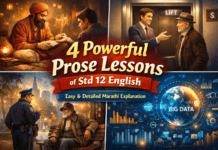You will find Appreciation of all Poems Class 12 at one place here. Read each one twice, try to remember what you read, read again to find what you missed. Repeat the action for each poem.
प्रत्येकाला दोनदा वाचा, आपण काय वाचले ते लक्षात ठेवण्याचा प्रयत्न करा, आपण काय विसरलो ते शोधण्यासाठी पुन्हा वाचा. प्रत्येक कवितेसाठी ही क्रिया पुन्हा करा.
—
1. Indian Weavers by Sarojini Naidu
About Poet: Sarojini Naidu, also known as the Nightingale of India, was a celebrated poet and a freedom fighter. Her works often reflect Indian culture, tradition, and life.
About Poem: This poem describes the different stages of human life through the work of Indian weavers.
Theme: The cycle of life — birth, youth, and death — is symbolized by the weavers’ creation of garments.
Type of Poem/Poetic Devices:
Lyric poem.
Poetic devices: Metaphor (stages of life represented by cloth), Symbolism (blue, purple, white colors), Alliteration, Repetition.
Language: Simple, musical, and vivid with colorful imagery.
Message/Values: The poem highlights the beauty of life’s stages while conveying the significance of art and labor.
—
2. Song of the Open Road by Walt Whitman
About Poet: Walt Whitman, a 19th-century American poet, is known for his free verse poetry and themes of democracy, nature, and individuality.
About Poem: This poem celebrates freedom, the joy of journeying, and the opportunities life offers.
Theme: Life is a journey, and the open road symbolizes freedom, possibilities, and self-discovery.
Type of Poem/Poetic Devices:
Free verse.
Poetic devices: Metaphor (road as life’s journey), Symbolism (freedom and opportunity), Repetition.
Language: Optimistic and conversational, with vivid and inspiring imagery.
Message/Values: The poem encourages self-reliance, adventure, and embracing life’s journey with a free spirit.
—
3. The Inchcape Rock by Robert Southey
About Poet: Robert Southey was an English Romantic poet and Poet Laureate, known for his narrative poems.
About Poem: A ballad that tells the story of a pirate who removes a warning bell, only to perish on the same rock.
Theme: Evil deeds lead to self-destruction; poetic justice prevails.
Type of Poem/Poetic Devices:
Narrative ballad.
Poetic devices: Symbolism (Inchcape Rock as danger), Alliteration, Imagery, Rhyme scheme (abab).
Language: Simple and rhythmic with vivid imagery and moral undertones.
Message/Values: The poem conveys that selfishness and wicked acts ultimately lead to one’s downfall.
—
4. Have You Earned Your Tomorrow by Edgar Guest
About Poet: Edgar Guest was known as the People’s Poet for his uplifting and moralistic poetry.
About Poem: The poem is a reflective call to evaluate one’s actions and contributions.
Theme: Self-assessment and moral responsibility — living a life that impacts others positively.
Type of Poem/Poetic Devices:
Reflective and moralistic poem.
Poetic devices: Rhetorical questions, Repetition, Alliteration.
Language: Simple, conversational, and thought-provoking.
Message/Values: The poem inspires kindness, self-reflection, and the importance of contributing positively to the world.
—
5. Father Returning Home by Dilip Chitre
About Poet: Dilip Chitre was a renowned Indian poet, critic, and translator, often focusing on urban alienation.
About Poem: The poem reflects the loneliness of a father in a modern urban setup.
Theme: Alienation, emotional disconnect, and the struggles of urban life.
Type of Poem/Poetic Devices:
Free verse.
Poetic devices: Imagery (describing the father’s journey), Simile, Symbolism (rain, train).
Language: Stark, minimalistic, and reflective.
Message/Values: The poem emphasizes the isolation of individuals in modern society and the emotional void in relationships.
—
6. She Walks in Beauty by George Byron
About Poet: Lord Byron, a leading Romantic poet, was known for his lyrical poetry celebrating beauty, love, and nature.
About Poem: The poem is an ode to a woman’s inner and outer beauty.
Theme: The harmonious combination of physical beauty and inner purity.
Type of Poem/Poetic Devices:
Lyrical poem.
Poetic devices: Simile (beauty compared to the night), Contrast (light and dark), Alliteration, Imagery.
Language: Romantic, elegant, and musical.
Message/Values: True beauty lies in the harmony between inner goodness and physical appearance.
7. Money by William H. Davies
About Poet: William H. Davies was a Welsh poet known for his poems that critique materialism and modern life.
About Poem: The poem discusses how wealth changes relationships and happiness.
Theme: The limitations of wealth and the simple joys of life.
Type of Poem/Poetic Devices:
Reflective poem.
Poetic devices: Contrast, Symbolism (money), Irony, Repetition.
Language: Simple and straightforward with a conversational tone.
Message/Values: True happiness comes from meaningful relationships and experiences, not material wealth.
—
8. Small Towns and Rivers by Mamang Dai
About Poet: Mamang Dai is a poet and journalist from Arunachal Pradesh whose works explore nature, identity, and culture.
About Poem: The poem celebrates the beauty of small towns and rivers, emphasizing their cultural and emotional significance.
Theme: Connection between humans and nature, memories, and the passage of time.
Type of Poem/Poetic Devices:
Free verse.
Poetic devices: Symbolism (rivers as timeless continuity), Imagery, Personification.
Language: Nostalgic, serene, and reflective with vivid descriptions.
Message/Values: The poem reminds readers of the deep bond between people, nature, and cultural heritage, urging us to preserve these connections.
A trick to remember poems and their poets with key words:
1. Walt Whitman takes a journey and sings on the Open Road (Song of the Open Road), celebrating freedom and opportunity under the open sky.
2. Sarojini Naidu weaves magic through her poem Indian Weavers, capturing the three stages of life: birth, youth, and death.
3. Robert Southey anchors the tale of The Inchcape Rock, highlighting the pride and downfall of a pirate who tampered with the warning bell.
4. Edgar Guest questions, “Have You Earned Your Tomorrow?”, inspiring thoughts on kindness, purpose, and living for others.
5. Dilip Chitre writes about his father Returning Home (Father Returning Home), depicting loneliness, alienation, and the struggles of aging.
6. William H. Davies reflects on the troubles of too much Money, emphasizing how greed and wealth steal joy and simplicity from life.
7. George Gordon Byron praises his beloved who Walks in Beauty (She Walks in Beauty), comparing her to starry nights, harmony, and graceful perfection.
8. Mamang Dai beautifully describes Small Towns and Rivers, celebrating nature, culture, and the passage of time in her homeland.









Very nice
it’s very easy to understand thank you for this website
J m r c l g
In learning of appreciation,
Is very helpful for me
Follow me
Thanks
It very easy
And it’s very helpful for mee
Thanks
Its amazing to revise it
It’s very helpful
Thanks
It is easier to learn and method of keypoint is easier to recape the appreciation 👍😊
Thank you 🙏
Very nice and soo simple language. You have done it ….👀👍
Kalyan
Very good
It is very helpful
Woow so beautiful 😍 🤩
Simple short and understandable appreciations 📖
Thank you ☺️
Thanks
Simple short and understandable appreciation thank you
It very help
It’s amazing 😍
Wonderful!